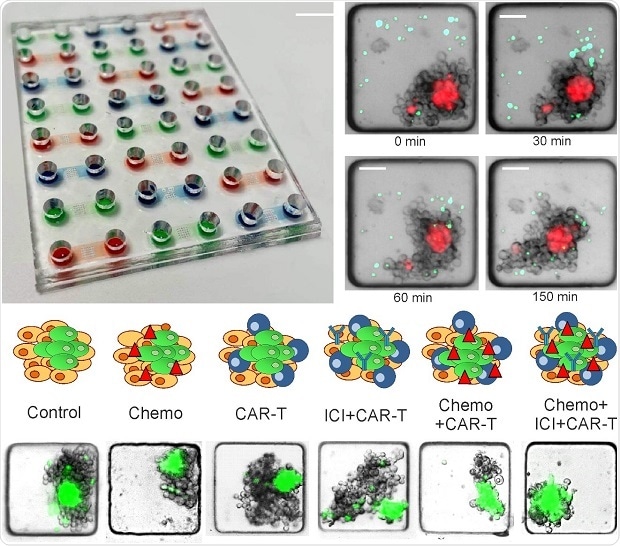AMSBIO have supplied custom Chimeric antigen receptor (CAR)-T products to the University of Strathclyde (UoS) in Glasgow, UK, and ScreenIn3D Ltd, allowing them to perform novel immune-oncology assays in 3D microfluidic cancer models.

Top left: ONCO-Chip 3D microfluidic plate. Top right: time sequence showing CAR-T cells interacting with 3D tumour models. Bottom: schematic and microscopy images of CAR-T killing cancer cells only (unlabeled) in different combination treatments. Image credit: AMS Bio
CAR-T cells are genetically modified T-cells used to find and kill cancer cells by targeting specific cancer-associated proteins, or antigens. CAR-T cell therapy is highly effective against haematological malignancies, but faces challenges in solid tumours due to the immunosuppressive effects of the tumour microenvironment. Often, combination therapies, such chemotherapy and checkpoint blockage, are used with CAR-T to improve efficacy.
To investigate CAR-T efficacy, their off-target cytotoxicity and synergistic effects when used in combination assays, UoS and ScreenIn3D researchers developed novel miniaturised screening assays that use very small amounts of CAR-T cells in 3D complex in vitro models of solid tumours on a chip.
This exciting technological advance by UoS and ScreenIn3D researchers is described in detail in a recently published technical article – see https://bit.ly/3iASDy0
AMSBIO offers a custom service that enables researchers to take advantage of the astonishing clinical breakthroughs achieved with CAR-T cells in various haematological malignancies. Drawing upon its expertise in monoclonal antibody development (rabbit and mouse), AMSBIO can help you design, plan and execute your CAR-T study, whether you are in the preclinical, clinical or proof of concept stage. The AMSBIO CAR-T platform is highly adaptable to your needs and starting materials, allowing you to start with a target molecule (Phase I) or antibody (Phase II). As part of their custom CAR-T development service, AMSBIO construct the single chain variable fragment (ScFv), transfer it into a CAR lentivector of your choice, make lentivirus and transduce activated human (or mouse) T cells. After the CAR-T cells proliferate, the cytotoxicity is measured in a real time assay, CAR expression analysed and cytokine production quantified. For further information please visit https://www.amsbio.com/car-t-cell-research/ or contact AMSBIO on+44-1235-828200 / +1-617-945-5033 / [email protected].
Founded in 2018 - ScreenIn3D is a start-up company based in the Technology and Innovation Centre at the University of Strathclyde, UK. ScreenIn3D utilises the latest advances in microfluidics and 3D culture to develop a unique microfluidic screening platform. Using its propriety ONCO-Chip 3D technology – ScreenIn3D is able to offer high quality pre-clinical screening services to biotech and pharmaceutical companies with interest in developing new oncology assays. For further information please visit https://screenin3d.com/